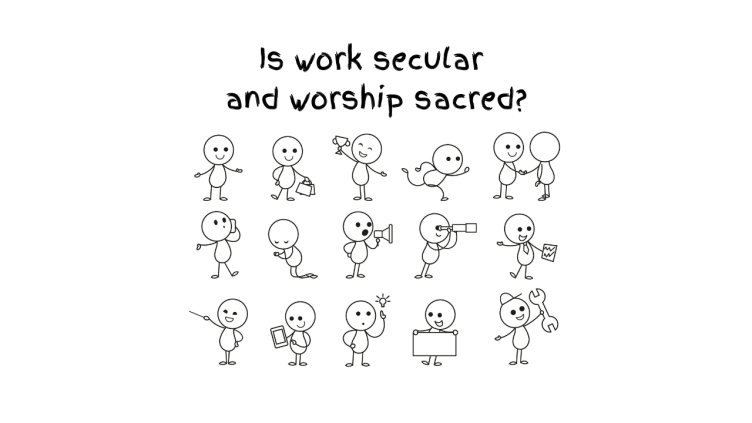Let us offer to God acceptable worship, with reverence and awe!
For many years, I did not see the connection between labour and worship. I started working officially at the age of ten. My father, an established businessman at the time, owned a few businesses. You had to work in these businesses for as long as you were my father’s child. As stated earlier, I have nothing against that – it helped shape who and what I became later in life with much gratitude and appreciation to my father.
To me, as to many Christians today, labour was secular and worship was sacred. Later in life, God began to show me the sacredness of our labour – in whatever He calls us to do. Many people want their work to be meaningful; I did for a long time. I didn’t understand how my first odd jobs as a tutor, typist, perfume salesperson, and administrator, among other things, could be considered worship to God. I believed that for my work to be meaningful, it had to be spiritual, such as evangelism, pastoral work, church planting, and so on. But we all know that not everyone can become a pastor or a ministry worker.
Most people are pushed away from careers that reward them with more money, power, and influence over others by this type of thinking. Even when this is accomplished, these people continue to live meaningless lives. This is because we are all looking for significance. I would define significance as that deep feeling within, that you are doing something meaningful on this earth; not outward attention from men, not even recognition by men – but that deep feeling within you, when you are alone in the middle of the night and you know your life matters because you are contributing to humanity.
We spend 50 to 75 per cent of our waking hours and 60 to 90 per cent of the years of our lives working. Yet many of us never invest even a fraction of that time exploring the vision that drives our lives and works. ~ Darrow Miller ~
Avodah – One Word for Worship, Serve and Work
It is good that many millennials are looking for something more; for impactful lives and meaningful employment. One of my friends is always hopping from one job to another, looking for ‘something’. There is not enough money in this world to replace that ‘something’ we keep looking for. The key to this quest can be explained by an ancient Hebrew word: Avodah.
Avodah is used 289 times in the Old Testament and is translated variously as “worship, “serve” and “work”. In some verses, Avodah refers to work – as in cultivating the field or performing common labour. Let’s look at a few Scriptures:
“And there was no man to work (Avodah) the ground” Genesis 2:5. “The Lord God took the man and put him in the garden of Eden to work (Avodah) it and keep it” Genesis 2:15.
In Exodus 34:21, when God renews the covenant with Moses, He says, “You shall work (Avodah) six days.”
In other verses, Avodah means to worship – as in worshipping the Lord:
“This is what the LORD says: ‘Let my people go, so that they may worship (Avodah) me'” Exodus 8:1.
“Then he summoned Moses and Aaron by night and said, ‘Up, go out from among my people, both you and the people of Israel; and go, serve (Avodah) the Lord …'” Exodus 12:31.
“And if it is evil in your eyes to serve the Lord, choose this day whom you will serve, whether the gods your fathers served in the region beyond the River or the gods of the Amorites in whose land you dwell. But as for me and my house, we will serve (Avodah) the Lord” Joshua 24:15.
Avodah reveals the holistic, integrative, and comprehensive nature of the Hebrew mind. The same word is used for working in our calling as it is for worshipping the Lord. God sent us here on earth to do work-worship. We work (Avodah) and worship (Avodah) the living God while fulfilling the First Commission (Genesis 1:26-28) to have dominion over all God’s creation – this is our cultural mandate because we are made in the image and likeness of God.
With this understanding, our work should be regarded as a form of worship. Every morning when we wake up to go to work, we are worshiping God. Worship is defined as the feeling or expression of reverence and adoration for God. When we go to serve humanity in the places God has sent us and in the ways He has instructed us, that is worship to God. It demonstrates that we value God and His instructions so much that we are willing to obey His instructions by working in various places. As a result, our daily work becomes a form of worship to God.
Emulate the Hebrew Holistic Mindset – Worship is for Sunday and the Rest of the Week
We should emulate the Hebrew holistic mind, unlike the Greek, there is no separation of labour from worship. Worship is not only for Sunday but for Monday and the rest of the week as well. Worship is not limited to a religious meeting in a building or a public evangelistic effort. Worship is to take place during our everyday lives, in our homes, in the office, in the factory – wherever it is we work. The God of the Bible is not a part-time God so our worship should not be thought of as part-time. Worship, for the Hebrew, was a continuous act, and both worship and work were seamless.
Today, many churches are program-driven. It is possible to have programs every day of the week to attract people to the church buildings with the belief that it is more spiritual to be in a church building than at a different place of work. The more frequently a believer appears “at church,” the more spiritual they are perceived to be. While I have nothing against this, I am discouraging the mentality that worship can only happen in the church buildings.
My husband and I chose several service departments in our local church about a decade ago from the time of writing this book. Being on the church grounds all the time made us feel (and appear) very spiritual. The sad part for me is that I always felt more spiritual and connected to God at the church premises compared to when I went to work. This was even though I was already working with my husband in a Christian missions organization. How much worse would I have felt if I worked in a place like a bank? Or a restaurant?
My husband has always been the more mature one spiritually between the two of us, and this has helped anchor our lives to God. He’s (almost) always clear with God’s instructions for us as a couple, as a family and as a ministry. He would continually nudge me to seek opportunities to serve and worship God in all other areas of my life and not just in the church programs and premises.
When my eyes finally opened, I saw the missions organization for what it was – a place of worship Monday to Friday where I could advance the Kingdom of God and obey His commands as a form of worship. I started to take the task seriously, and I thank God that slowly He’s been teaching me how to work-worship at my place of assignment.
In addition, for many Christians, worship is music (singing), prayers and other religious activities especially when done at a gathering or in private at a certain time of the day. However, the first place we see music in the Bible was during the exodus when Miriam broke into a song. Before that, the patriarchs worshipped God through their obedience. By Adam tilling the land as God had instructed, it was worship. Enoch walking with God until he was no more was worship. Noah’s obedience to build an ark when there had never been rain coming from above demonstrated his awe and faith in God and that was worship. Abraham’s obedience to leave Ur of Chaldeans to Canaan as well as sacrifice his only promise-son Isaac, was worship. Isaac remaining in Canaan and redigging Abraham’s wells during a drought was obedience to God and a form of worship. Jacob’s obedience to God’s instructions throughout his life was worship.
Worship is not just about religious activities in a religious building with a group of people. Worship is a lifestyle of connection and obedience to God in all the places He has sent us. This includes both secular and religious work and workplaces. For as long as God has given you the instructions on what to do, when you do it, that is worship to Him.
Labour (Work) as Worship Is Our Place of Sabbath
God placed us here on earth to glorify Him by governing in His stead. To that end, we are to labour and serve humanity in whatever capacity God instructs us to. A cleaner will be as equally satisfied as a bank manager because that is the portion assigned to them in the Lord’s vineyard. If they do it well and with excellence, they will please God and honour His name. This will be their worship to God. Work and worship should be seamless – Avodah!
When you look at the parable of the talents (Matthew 25:14-30), it’s the Master that determined what each of the servants got. This was based on the capabilities He had put in each of them. One got five, another got two and another got one talent. Don’t live life comparing yourself with what your neighbour has received. Focus on what you have received, and work it to honour the Master by returning to Him one-hundred fold. The servant who had five talents brought back ten and the one who had two talents brought back four. Both servants brought a hundred fold.
When the Master is pleased, there will be a reward for the labourer. As we saw earlier, this is rest for the soul of the labourer as well as other benefits that He daily loads us with (Psalms 68:19). A business that is work-worshipping will enjoy Kingdom backing in all the resources they require. This will give them the rest they need. This rest can be manifested in miracles, signs and wonders, divine provision, divine protection, unexplainable sales strategies, wisdom and witty inventions, supernatural favour with men, and excellent human resources among others.
When our goal is to please the Master, we will rely only on Him to take the lead. When work is worship, it changes our attitude to allow God to work in us both to will and to do according to His will (Philippians 2:13). This will make us bear fruit, not what we humanly define fruit as (material things) but what God calls fruit. Godly fruits glorify God. The rest from God always comes with better wages, as seen in John 4.
For Ruth and Naomi in Moab, things were not good – they had lost the men in their lives. When they returned to Israel, in Bethlehem, Ruth sustained herself and her mother-in-law by gleaning kernels from the barley harvest. One day, she met a field owner named Boaz, who received her kindly. Naomi urged Ruth to return to Boaz at night and “uncover his feet” – an invitation to have relations with her. In response, Boaz promised to take care of her, a symbolic acceptance of marriage (Ruth 3:11).
What strikes me in this story is that Boaz tells her, “You have come under the wings of God of Israel; therefore, He shall watch over you”. Therefore, Boaz provided for and cared for her. She found purpose by later becoming the mother of Obed, who bore Jesse, the father of King David from whom we get the lineage of Christ. Ruth received her Sabbath by connecting with the God of her mother-in-law, being obedient and submissive to her, and through her work in the fields, it became her form of work-worship to the God of Israel.
Allow Jesus to Define Your Purpose To Enable You to Worship At Work And Enjoy The Sabbath
In Luke 5:1-11, we see Jesus defining Peter’s purpose. Peter had been toiling all night, as most of us do today. We never get satisfied or fulfilled, and even when we make money or achieve the success we desire, we are not happy or the happiness is short-lived. Peter allowed Jesus to use his boat to teach the people that were gathered around the shores. Then Jesus told him to cast the net for a catch – Peter’s response should be every Christian’s response today.
Master, we worked hard all night [to the point of exhaustion] and caught nothing [in our nets], but at Your word, I will [do as you say and] lower the nets [again].
Jesus gives us direction for our lives, our businesses, ministries, families, jobs etc. Many times, we right away give the defeated analysis of our situation.
“God, I have been trying to get my husband to get saved for the last two decades.”
“God, I have tried my best with that child, she will never change.”
“Jesus, I have tried my best with that business or ministry, it will not work.”
“Jesus, you know how much I have tried to create Kingdom impact in that job, it’s just not possible.”
These are responses we have most times when He tells us to take a specific direction. While this analysis might be physically accurate, we should always add the second portion of Peter’s response to Jesus,
“But at Your word, I will [do as you say and] lower the nets [again].”
When Peter obeyed, he fished more than he had tried the previous night. This was Jesus showing him that He could provide for him no matter how dire the situation was. Though Jesus was a carpenter in professional training and Peter a professional fisherman, Jesus was an expert in fishing because He is the Son of God.
We see Jesus do many great and mighty things – because He was the son of God. He was also a wine master turning water into wine and a physician healing the sick and raising the dead. Anything about your life, business, ministry, family, or job – Jesus knows and is eager to work with you to make everything beautiful. Amen.
Will you be obedient to Him and His instructions so that you can enjoy the Sabbath rest?
Like, comment, share and subscribe on LinkedIn, YouTube, Anchor Podcast, Facebook and my website – @muthoni mukhango. I appreciate your engagement in restoring the heart of worship in our daily work.
Excerpt from the book Too Busy for Worship by Muthoni Omukhango available at www.muthoniomukhango.kenyaclc.org



